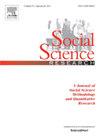评估助理教授职位申请人时的性别偏见?来自德国和意大利统一调查实验的证据
IF 3.5
2区 社会学
Q1 SOCIOLOGY
引用次数: 0
摘要
本研究调查了德国和意大利在评估助理教授职位申请人时存在的性别偏见。考虑到两国不同的性别规范氛围和性别平等战略,我们借鉴偏见表达的 "合理化-抑制 "模型,探讨在聘任过程中对女性的偏见是否会被表达、抑制甚至逆转。通过对经济学、政治学和社会科学教授进行统一的因子调查实验,我们发现德国女性在获得助理教授职位的认知资格和收到面试邀请的倾向方面都具有优势。相比之下,意大利的女性既没有劣势也没有优势。我们还研究了当申请人的学术表现(共同著作)和职业承诺(育儿假)不明确时是否存在性别偏见。我们的研究结果表明,这两个国家都存在合著惩罚和育儿溢价,没有观察到性别差异。我们的探索性国家比较表明,与意大利的性别中立政策相比,德国积极的性别平等政策可能会更有效地缩小助理教授聘任中的性别差距,因为它有利于同等资格的女性申请者。本文章由计算机程序翻译,如有差异,请以英文原文为准。
Gender bias in evaluating assistant professorship applicants? Evidence from harmonized survey experiments in Germany and Italy
This study investigates gender biases in the evaluation of applicants for assistant professorships in Germany and Italy. Drawing on the justification-suppression model of prejudice expression, we explore whether biases against women are expressed, suppressed, or even reversed in the appointment process, considering the different normative gender climates and gender equality strategies in the two countries. Using harmonized factorial survey experiments with professors of economics, political science, and social sciences, we found that women in Germany have an advantage both in perceived qualification for an assistant professorship and in the propensity to receive an interview invitation. In contrast, women in Italy are neither disadvantaged nor advantaged. We also examine whether gender biases exist when there is ambiguity about applicants' academic performance (co-authorship) and career commitment (parental leave). Our results reveal a co-authorship penalty and a parenthood premium in both countries, with no gender differences observed. Our exploratory country comparison suggests that Germany's proactive gender equality policies may be more effective in reducing the gender gap in assistant professor appointments compared to Italy's gender-neutral approach, by favoring equally qualified female applicants.
求助全文
通过发布文献求助,成功后即可免费获取论文全文。
去求助
来源期刊

Social Science Research
SOCIOLOGY-
CiteScore
4.30
自引率
4.00%
发文量
0
审稿时长
65 days
期刊介绍:
Social Science Research publishes papers devoted to quantitative social science research and methodology. The journal features articles that illustrate the use of quantitative methods in the empirical solution of substantive problems, and emphasizes those concerned with issues or methods that cut across traditional disciplinary lines. Special attention is given to methods that have been used by only one particular social science discipline, but that may have application to a broader range of areas.
 求助内容:
求助内容: 应助结果提醒方式:
应助结果提醒方式:


